19 best corporate social responsibility (CSR) software tools to drive impact

Key takeaways
Corporate social responsibility (CSR) software provides a unified platform to manage and track various CSR initiatives, including charitable giving, volunteering, sustainability efforts, and ethical practices.
Some of the top CSR tools include Bonterra CyberGrants, Benevity Corporate Purpose, and Blackbaud YourCause.
Contributing to the success of nonprofit missions is important. But how exactly do you find the right organizations to partner with, and how do you know your charitable contributions are actually making a difference?
CSR software is designed to help companies connect with nonprofits and measure the impact of their contributions. With it, corporations can monitor key performance indicators, social impact, and governance practices.
Let’s look at the top tools and tips for finding the best CSR software for your company.
What is CSR software?
Corporate social responsibility software is a technology solution designed to help companies manage, track, and report on their environmental, social, and governance (ESG) initiatives and impacts.
It provides a centralized platform to streamline various aspects of a company’s CSR strategy, from setting goals and implementing programs to collecting data and generating comprehensive reports for both internal and external stakeholders.
Best CSR software tools overview
Corporate social responsibility platforms have become essential tools for businesses aiming to manage and amplify their positive impact on society and the environment. But which platforms offer features like sustainability initiatives, impact reporting, and employee giving software? Let’s look at the top 13 choices.
| Platform | Best for | Standout feature |
| Bonterra CyberGrants | Highly configurable CSR management needs | Robust grant lifecycle and engagement tools |
| Benevity Corporate Purpose | Employee engagement and volunteering | Integrated platform for giving |
| Blackbaud YourCause | Large, complex corporations | Global grants management capabilities |
| Candid GuideStar | Publicly available data and insights | Advanced search and filtering capabilities |
| Charity Miles | Fitness-based fundraising for charitable causes | Mobile app that donates based on user activities |
| Chezuba | Engaging skilled volunteers globally | Project-based volunteering opportunities |
| Deed | A modern, employee-centric platform | User-friendly interface |
| EcoVadis | Globally recognized sustainability ratings | Global sustainability ratings |
| Goodera | Managing global CSR and sustainability | Comprehensive suite for CSR and volunteering |
| GoodUp | Gamified employee engagement in volunteering | Gamified challenges for sustainability and giving |
| Goodworld | User-friendly modern giving solutions | Easy-to-use online auction platform |
| Millie | Skilled volunteering opportunities | Focus on skills-based volunteering |
| OnHand | Micro-volunteering opportunities | Mobile-first platform |
1. Bonterra CyberGrants
Best for: Highly configurable CSR management needs
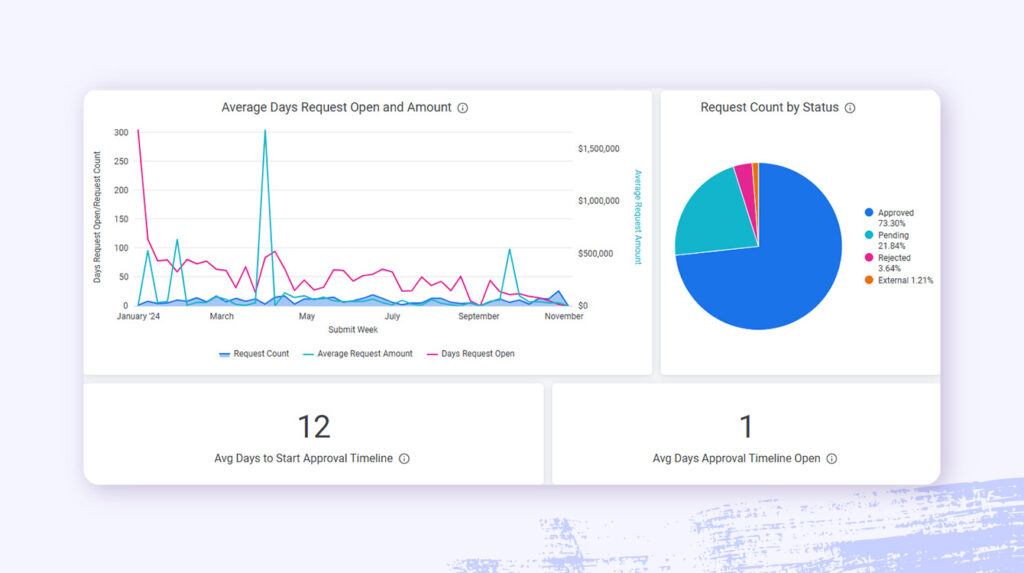
Bonterra CyberGrants is a leading CSR management software designed to empower corporations to effectively plan, execute, and measure their social impact programs. As one of the best CSR software platforms, it offers a wide array of features tailored to streamline grantmaking processes, from application management and review workflows to payment processing and impact assessment.
Beyond grant management, CyberGrants facilitates stakeholder engagement by providing tools for communication, collaboration, and volunteer management. Its highly configurable nature allows companies to customize the platform to align with their specific ESG and CSR strategies and reporting requirements.
Bonterra CyberGrants is particularly beneficial for corporations needing life sciences software, where meticulous tracking of grants, clinical trial funding, and community health initiatives is crucial. Its scalability and flexibility make it a valuable asset for companies of all sizes looking to professionalize their CSR management and maximize their positive impact.
Key features
- Grant lifecycle management: End-to-end management of the grantmaking process, from application intake and review to fund distribution and reporting
- Stakeholder engagement tools: Features for managing communication, collaboration, and engagement with various stakeholders, including grantees, volunteers, and community partners
- Robust reporting and analytics: Comprehensive tools for tracking key performance indicators, generating customizable reports, and visualizing impact data to demonstrate ROI and inform future strategies

Pros and cons
| Pros | Cons |
| The platform’s adaptability allows companies to tailor it precisely to their unique CSR workflows | May require dedicated training and a steep learning curve |
| Offers robust data analysis and stakeholder engagement features | Cost may deter small teams that only need basic functionality |
| Designed to accommodate the needs of companies of various sizes and complexities | May be a more complex interface than necessary |
Rating
- G2: 4.1
Pricing: Custom pricing
- Bonterra CyberGrants Enterprise
- Bonterra CyberGrants Employee Engagement
- Bonterra CyberGrants Grants Management
2. Benevity Corporate Purpose
Best for: Employee engagement and volunteering
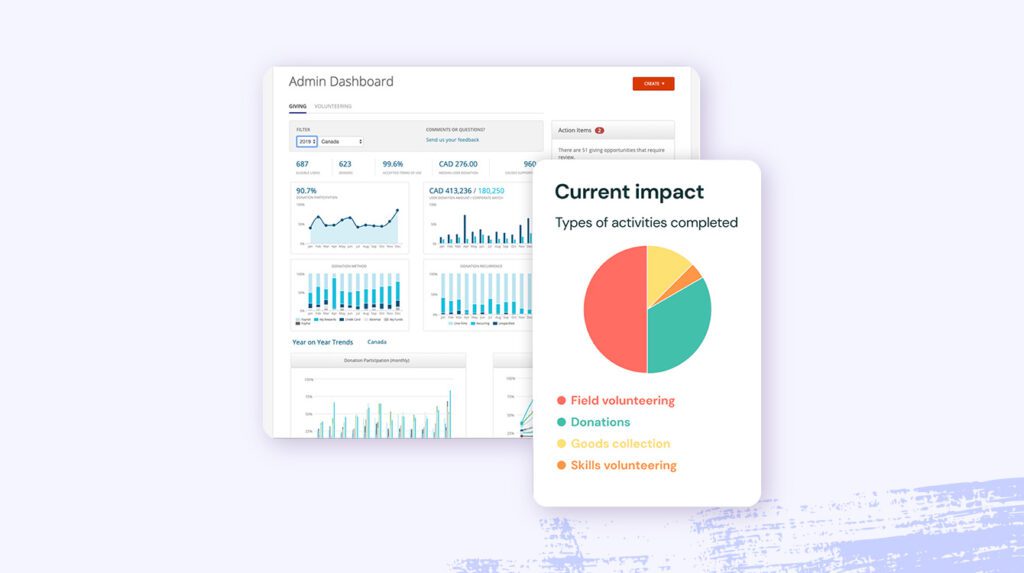
Benevity Corporate Purpose offers integrated solutions designed to empower companies to engage their employees in social impact initiatives. Similarly to Bonterra CyberGrants, Benevity facilitates a wide range of activities, including donation matching, payroll deductions for charitable giving, volunteer management, and skills-based volunteering opportunities.
The platform is designed for companies of various sizes looking to implement or scale their corporate giving and volunteering programs. Its user-friendly interface and diverse features cater to companies aiming to give their employees meaningful opportunities to contribute to their communities.
Key features
- Employee giving: Facilitates various giving methods, including payroll deductions, one-time donations, and matching gift programs
- Volunteer management: Enables corporations to track employee volunteer activities, including individual and team-based volunteering and skills-based volunteering
- Grants management: Supports the administration of corporate grants, allowing companies to manage applications, approvals, and reporting for their philanthropic initiatives
Pros and cons
| Pros | Cons |
| Offers a suite of employee engagement and giving tools in one integrated platform | Extensive features might be more unnecessary for smaller companies |
| User-friendly interface that encourages employee participation in social impact programs | Pricing structure may be a consideration for companies with limited budgets |
| Facilitates the tracking and reporting of employee engagement metrics | Customization options might not be as extensive as dedicated grant management systems |
Rating
- G2: 4.8
Pricing: Varies based on needs
3. Blackbaud YourCause
Best for: Scalable enterprise-level solutions
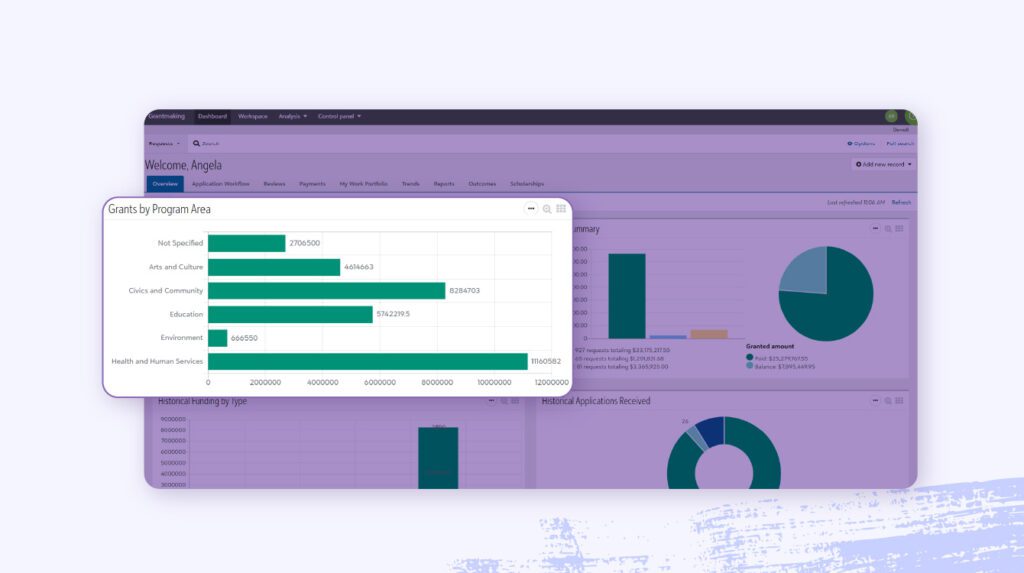
Blackbaud YourCause provides a suite of solutions designed to manage global corporate social responsibility and employee engagement programs. This platform offers extensive capabilities for facilitating employee giving campaigns, volunteer events, disaster relief efforts, and grants management.
YourCause is particularly suited for multinational corporations and companies with complex CSR requirements, including diverse giving options, multi-currency processing, and the need to manage programs across various geographic locations.
Key features
- Global employee engagement: Supports diverse giving options, volunteer management, and disaster relief programs across multiple countries and currencies
- Grants management: Facilitates the administration of corporate grantmaking, including application processes, eligibility rules, fund distribution, and impact measurement
- Reporting and analytics: Offers comprehensive reporting tools to track employee participation, donation amounts, volunteer hours, and the overall impact of CSR initiatives
Pros and cons
| Pros | Cons |
| Highly scalable and comprehensive solution suitable for large, global corporations | More complex and potentially more expensive than necessary for smaller companies |
| Robust capabilities for managing various aspects of CSR | Might require significant training and ongoing administrative resources |
| Strong reporting and analytics features to track program performance | Users may find the interface less intuitive compared to specialized solutions |
Rating
- G2: 4.0
Pricing: Varies based on needs
4. Candid GuideStar
Best for: Publicly available data and insights
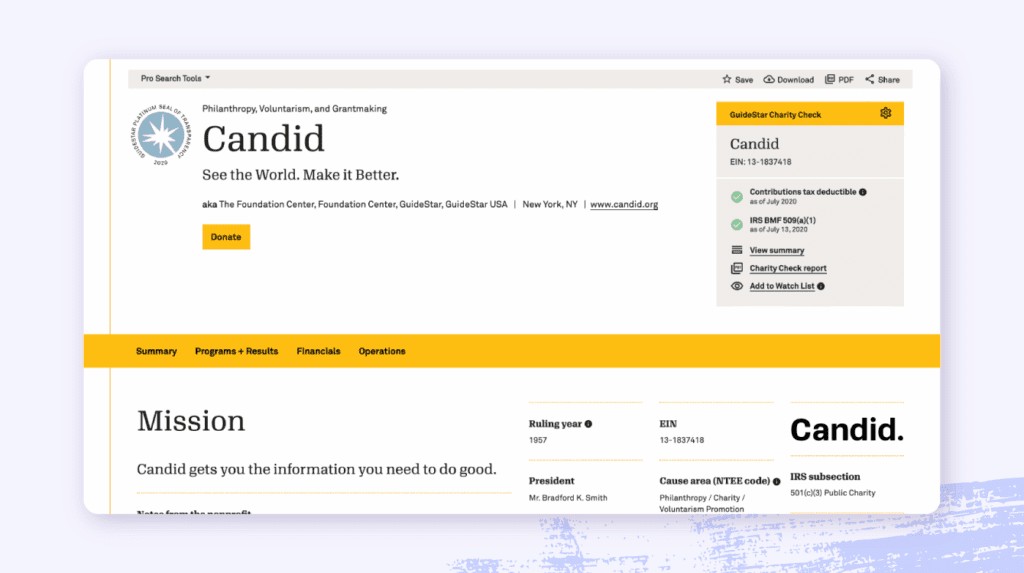
Candid GuideStar serves as a central hub for information on nonprofit organizations in the United States. It provides access to a vast database of IRS data, including Form 990 filings, which offer detailed financial and operational information about nonprofits. Beyond basic data, GuideStar offers various subscription levels that provide increasingly sophisticated tools for in-depth analysis, benchmarking, and identifying potential grantees or partners within the nonprofit sector.
GuideStar is particularly valuable for grantmakers, researchers, and individuals seeking to understand the landscape of nonprofit organizations, assess their financial health, and learn about their missions and programs.
Key features
- Nonprofit database: Access to IRS data for millions of U.S. nonprofit organizations
- Form 990 data: Provides access to electronically filed Form 990s, 990-EZs, and 990-Ns, offering insights into a nonprofit’s finances, governance, and activities
- Advanced filtering: Enables users to search for nonprofits based on various criteria, including location, mission area, impact type, and financial information
Pros and cons
| Pros | Cons |
| Offers a vast and comprehensive database of U.S. nonprofit information | Provides data and insights rather than direct management tools |
| Provides transparency into the financial and operational aspects of nonprofit organizations | The sheer volume of data can be overwhelming |
| Sophisticated analytical tools with paid subscriptions for in-depth research | Does not provide the direct engagement or workflow management features of dedicated CSR platforms |
Rating
- G2: 4.8
Pricing: Free with basic access
5. Charity Miles
Best for: Fitness-based fundraising for charitable causes
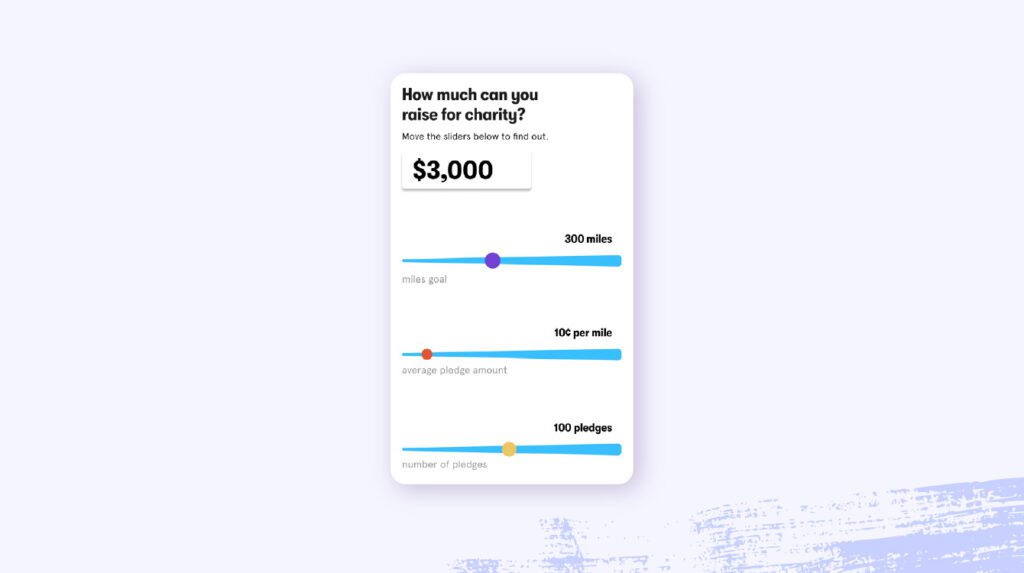
Charity Miles is a mobile application that enables users to earn money for their chosen charity by walking, running, or biking. The app tracks the distance users travel and allows them to select from a list of participating charities. Corporate sponsors contribute a small amount of money for every mile logged by users in support of their selected cause.
Charity Miles provides a unique way for individuals to combine their fitness activities with charitable giving, creating a tangible link between personal well-being and social impact measurement.
Key features
- Activity tracking: Automatically tracks walking, running, and biking distances using the phone’s GPS
- Charity selection: Offers a diverse list of reputable charities for users to support
- Sponsor contributions: Generate donations to selected charities based on the miles users log, funded by corporate sponsorships
Pros and cons
| Pros | Cons |
| A simple and engaging way for individuals to raise money for charity | The amount of money raised per mile is relatively small |
| Allows companies to promote employee wellness and corporate social responsibility simultaneously | Relies on corporate sponsorships, which may vary |
| Is a user-friendly mobile application | Focused on individual fitness-based fundraising without comprehensive management tools |
Rating
- G2: N/A
Pricing: Free
6. Chezuba
Best for: Engaging skilled volunteers globally for specific projects
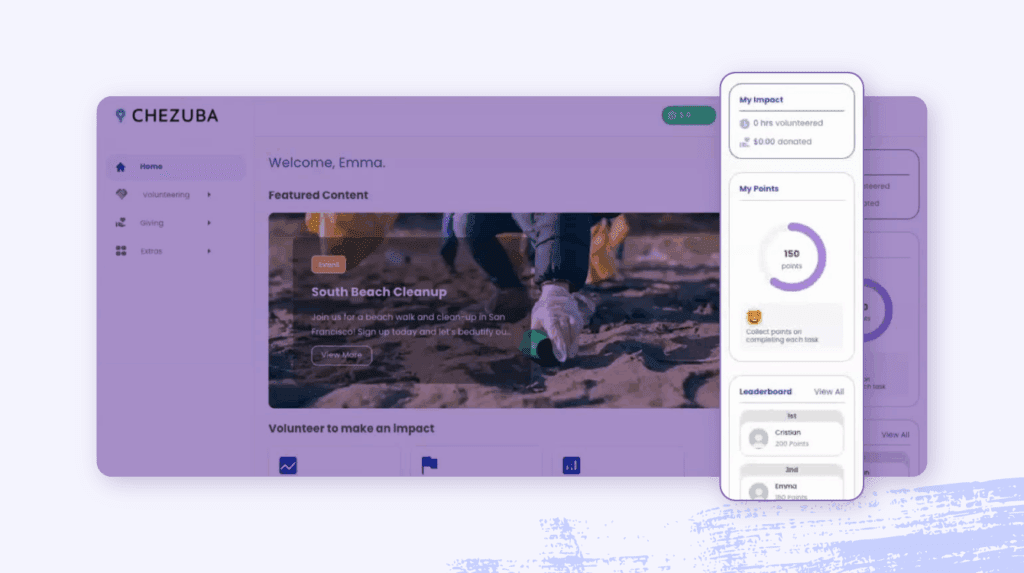
Chezuba is a platform that connects skilled professionals with nonprofit organizations worldwide for virtual volunteering opportunities. It enables nonprofits to access a global talent pool to support their projects in areas such as marketing, technology, strategy, and design.
Volunteers contribute their expertise remotely, helping nonprofits build capacity and achieve their missions more effectively. Chezuba is particularly beneficial for nonprofit organizations lacking the resources or local expertise for specific projects.
Key features
- Global skilled volunteer network: Access to a diverse pool of professionals with various skills who are willing to volunteer remotely
- Project-based volunteering: Facilitates short- or long-term project-based engagements tailored to the needs of nonprofits
- Skills matching: Connects nonprofits with volunteers whose skills and experience align with their project requirements
Pros and cons
| Pros | Cons |
| Gives nonprofits access to a global pool of skilled volunteers | Relies on the availability and matching of suitable volunteers for specific projects |
| Offers flexible, project-based volunteering opportunities | Requires effective coordination between nonprofits and remote volunteers |
| Facilitates meaningful engagement for volunteers looking to contribute | May not be suitable for tasks requiring in-person presence or local knowledge |
Rating
- G2: 4.9
Pricing: Varies based on needs
7. Deed
Best for: Modern, employee-centric platform needs
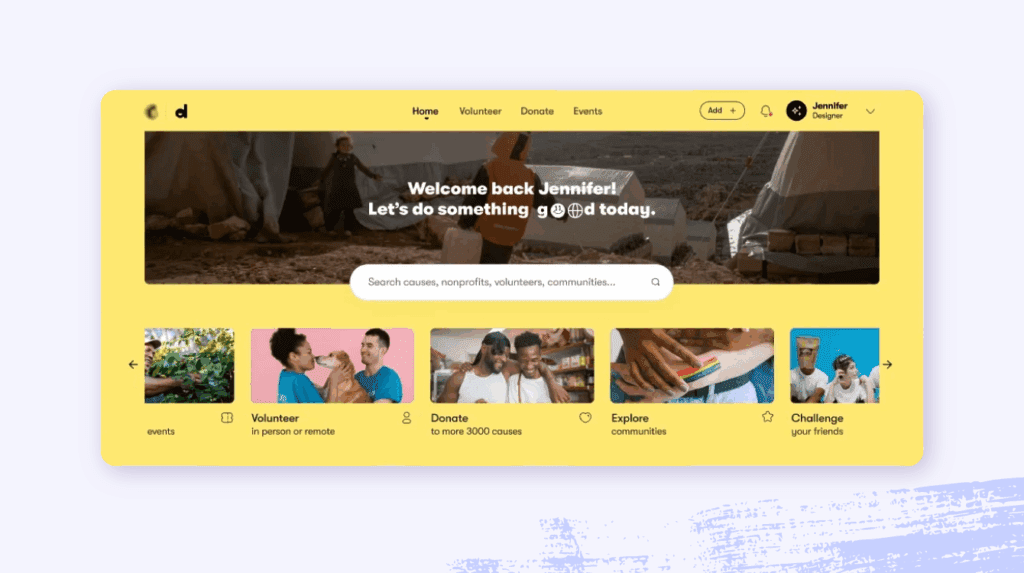
Deed is an employee impact platform designed to empower companies to engage their workforce in social good. It offers a user-friendly interface and a range of features to facilitate volunteering opportunities (both in-person and virtual), charitable giving campaigns, skills-based volunteering, and tracking of employee impact.
Deed is well-suited for companies looking for a CSR reporting software platform to centralize their employee social impact programs. Its focus on user experience and diverse activity options makes it appealing to a wide range of employees and helps drive participation in CSR initiatives.
Key features
- Charitable giving: Enables employees to donate to vetted nonprofits, often with company matching options, and supports various giving campaigns
- Skills-based volunteering: Connects employees with opportunities to use their professional skills to support nonprofit organizations
- Impact measurement and reporting: Provides tools to track employee participation, volunteer hours, donations, and the overall social impact of company programs
Pros and cons
| Pros | Cons |
| Encourages employee engagement in social impact activities | May have a less extensive history or a smaller user base for peer reviews |
| Integrates various aspects of employee giving and volunteering | Might not have the same level of deep customization as some enterprise-focused solutions |
| Provides robust tracking and reporting capabilities | Pricing structure may be a consideration for smaller companies |
Rating
- G2: 4.5
Pricing: Varies based on needs
8. EcoVadis
Best for: Globally recognized sustainability ratings
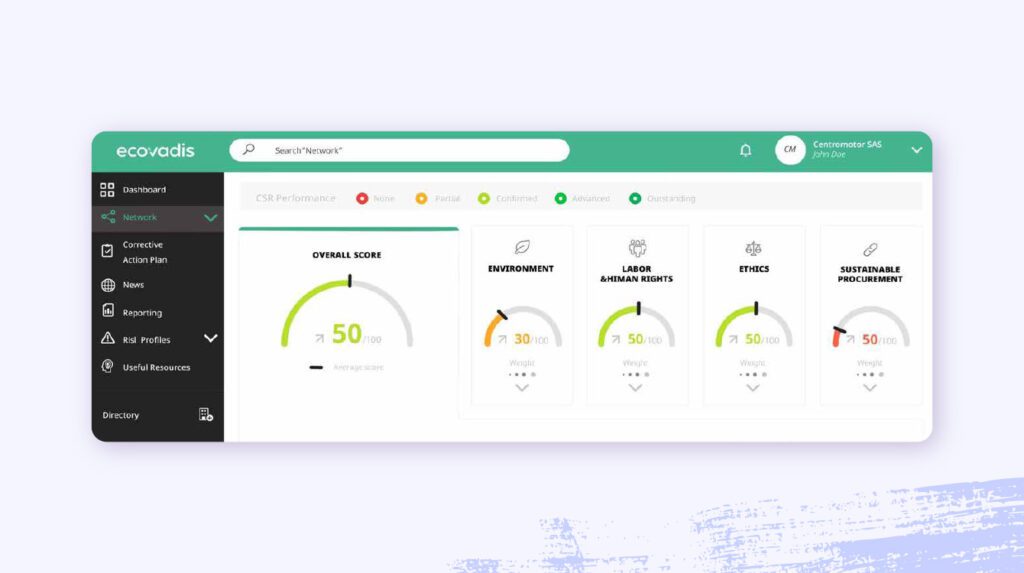
EcoVadis is a global sustainability ratings platform that assesses companies across four key themes: Environment, Labor & Human Rights, Ethics, and Sustainable Procurement. Its methodology is based on international sustainability standards and is supported by a global team of experts.
EcoVadis issues scorecards and ratings that help companies understand their sustainability performance, identify areas for improvement, and share progress with stakeholders. This platform is particularly valuable for large enterprises with complex supply chains that need to monitor and improve the sustainability practices of their trading partners.
Key features
- Sustainability ratings: Comprehensive assessments across Environment, Labor & Human Rights, Ethics, and Sustainable Procurement themes
- Scorecards and benchmarking: Detailed scorecards with performance ratings and benchmarking against industry peers
- Improvement tools: Actionable insights and tools to help companies improve their sustainability practices
Pros and cons
| Pros | Cons |
| Provides a globally recognized and trusted sustainability rating | Assessment process can be time-consuming |
| Offers a comprehensive assessment across key ESG areas | Subscription costs can be a barrier for smaller companies |
| Enables benchmarking and identification of improvement areas | Users report that the platform can lack transparency in its scoring methodology |
Rating
- G2: 3.6
Pricing: Starting at $1,470/year
9. Goodera
Best for: Impact measurement and global reach
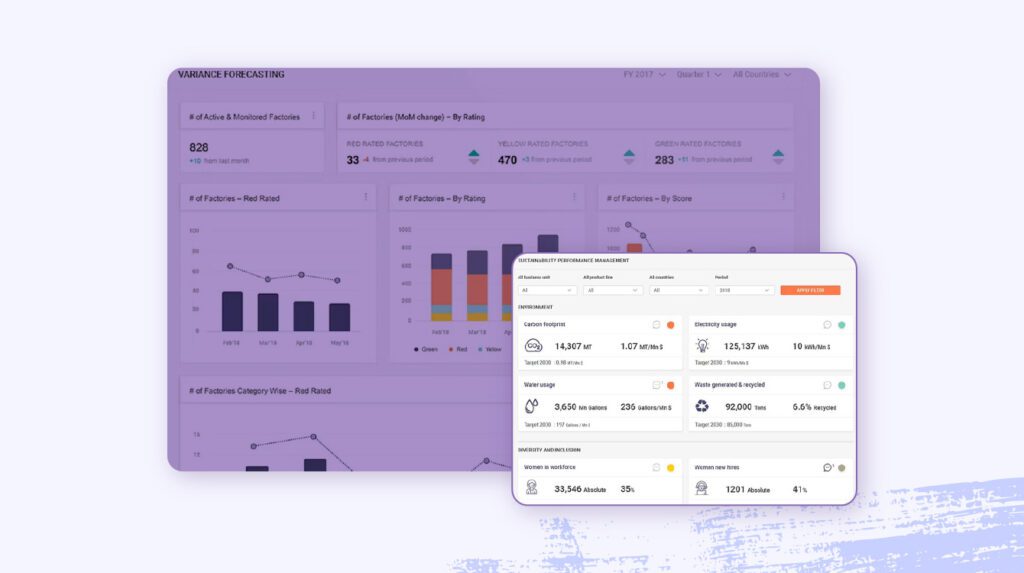
Goodera is designed to help companies manage and measure the impact of their CSR, sustainability, and employee volunteering programs. The platform enables companies to track, monitor, and report on their initiatives across various countries, providing real-time dashboards to communicate performance to stakeholders.
Goodera is particularly beneficial for companies with a global presence looking to manage complex CSR and sustainability programs, engage employees in diverse volunteering opportunities, and gain comprehensive insights into their social and environmental impact.
Key features
- Employee volunteering platform: Enables employees to discover and participate in volunteering events across various causes and geographies, with features for registration, attendance tracking, and feedback
- Grant management: Provides tools for corporations, foundations, and governments to manage their grantmaking processes, track impact, and gain real-time insights
- Sustainability management: Helps companies measure and report on their environmental and sustainability metrics, aligning with global reporting standards
Pros and cons
| Pros | Cons |
| Comprehensive suite of tools for managing various aspects of corporate social responsibility | Pricing may be geared toward mid-sized to large enterprises |
| Strong focus on impact measurement and providing data-driven insights | Extensive feature set might require a learning curve for new users |
| Facilitates global reach for both volunteering and CSR initiatives | Reviews suggest customer support responsiveness could be improved |
Rating
- G2: 4.4
Pricing: Varies based on needs
10. GoodUp
Best for: Employee engagement in volunteering and giving
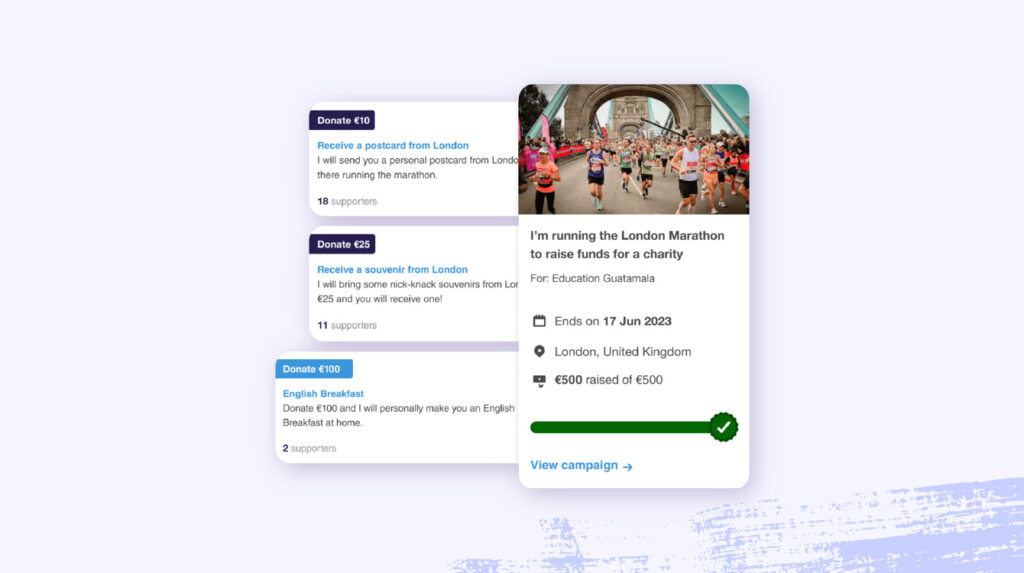
GoodUp is a platform designed to empower employees to take action on social and environmental issues. It provides tools for companies to organize and promote volunteering opportunities, facilitate charitable donations, and encourage sustainable behaviors within the workplace. GoodUp often incorporates elements of gamification and social interaction to drive participation and create a sense of community around impact initiatives.
This platform is particularly appealing to companies aiming to foster a culture of purpose and sustainability among their employees. Its engaging features and focus on collective action can help increase participation in CSR programs and amplify their overall impact.
Key features
- Volunteering management: Enables companies to organize and promote various volunteering opportunities, track employee participation, and measure the impact of volunteer efforts
- Charitable giving: Facilitates employee donations to nonprofit organizations, often with options for company matching and payroll deductions
- Sustainability challenges: Allows companies to create and run challenges focused on encouraging sustainable behaviors among employees, such as reducing waste or conserving energy
Pros and cons
| Pros | Cons |
| Engaging and user-friendly platform | May be less focused on in-depth grant management or complex CSR reporting |
| Integrates volunteering, giving, and sustainability actions into a single platform | The emphasis on gamification might not appeal to all employees |
| Utilizes gamification to motivate and reward employee involvement | The level of customization for specific company needs may vary |
Rating
- G2: 4.1
Pricing: Basic, Professional, and Enterprise plans
11. Goodworld
Best for: Online auctions and streamlined donation processes
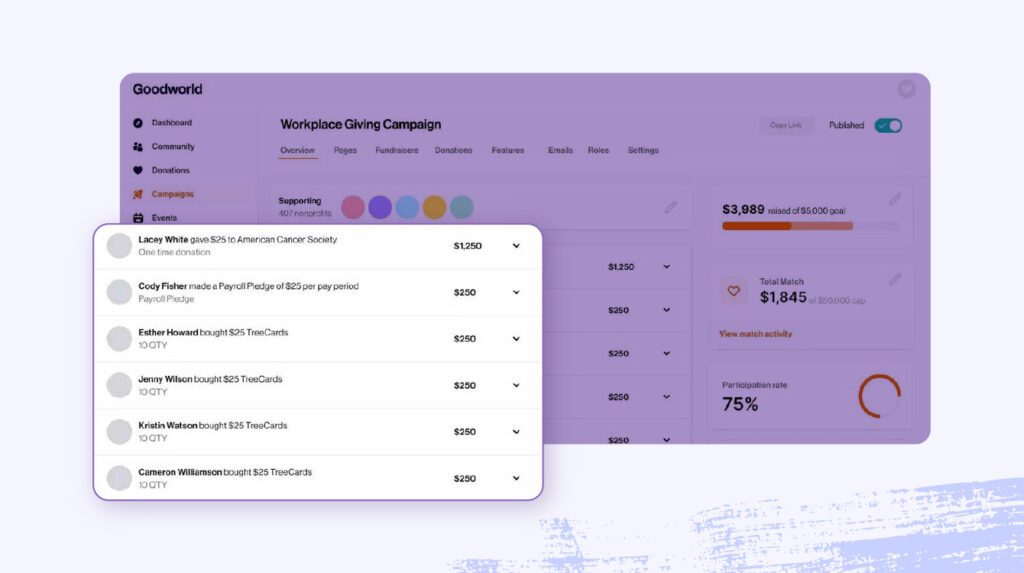
Goodworld is a social impact platform that provides tools for both nonprofit organizations and businesses to enhance their fundraising and social responsibility efforts. It is known for its innovative features like hashtag donations (#donate) on social media, user-friendly online auction capabilities, and embeddable donation buttons. Goodworld emphasizes creating seamless and engaging giving experiences for donors and aims to help companies amplify their impact through modern technology.
This platform is particularly well-suited for nonprofits looking to leverage social media for fundraising, host online auctions with ease, and simplify the online donation process for their supporters. Businesses can also utilize Goodworld for employee giving campaigns and customer engagement initiatives with a focus on social good.
Key features
- Online auction platform: Provides tools to easily set up and manage online fundraising auctions, including item uploads, bidding management, and payment processing
- Embeddable donate button: Allows nonprofits to embed a simple and secure donation button directly on their website
- Peer-to-peer fundraising: Offers features to create and manage fundraising campaigns and empower supporters to fundraise on behalf of the company
Pros and cons
| Pros | Cons |
| User-friendly platform for both administrators and donors | Has a stronger emphasis on fundraising and online events |
| Known for strong customer support and a responsive team | Some users have noted minor limitations in customization options |
| Integrates with other platforms like Salesforce | Certain features or advanced functionalities for businesses may come with a cost |
Rating
- G2: 4.8
Pricing: Starting at $2-6/month/employee
12. Millie
Best for: Empowering employees to engage in skilled volunteering
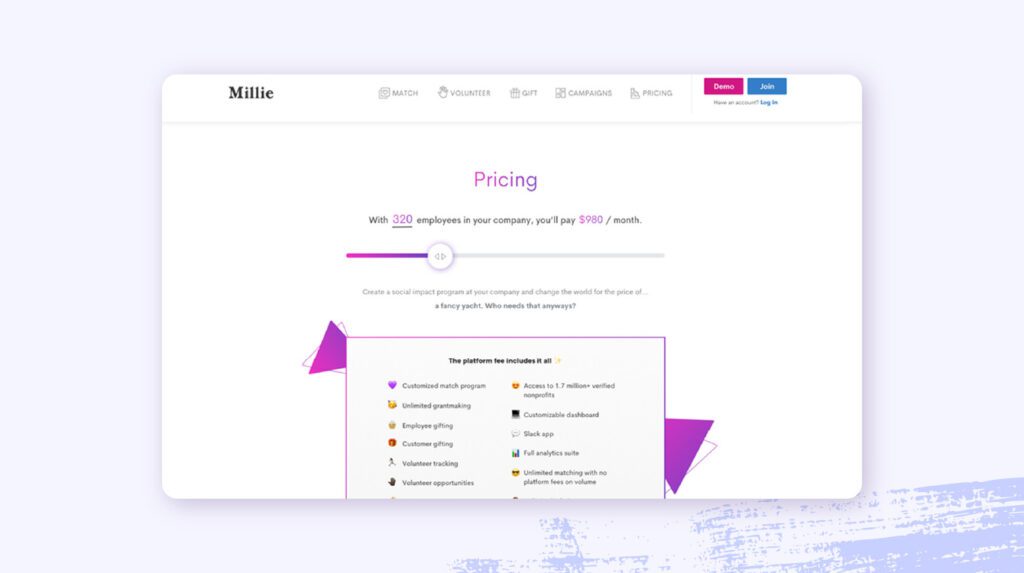
Millie specializes in connecting skilled professionals with short- and long-term volunteering opportunities where they can utilize their expertise to support the capacity building of social impact companies. Unlike general volunteering platforms, Millie focuses on skills-based volunteering, ensuring nonprofits receive targeted support while providing meaningful pro bono experiences.
Millie is particularly valuable for companies looking to offer employees impactful CSR programs that leverage their unique skills, enhance employee development, and provide significant value to nonprofit partners. It’s also beneficial for nonprofits seeking specific expertise they may lack internally.
Key features
- Skills-based volunteering opportunities: Focuses exclusively on matching professionals with volunteering roles that utilize their specific skills and experience
- Project-based engagements: Facilitates both short-term projects and long-term engagements based on the nonprofit’s needs and the volunteer’s availability.
- Global network of social impact: Connects volunteers with a diverse range of nonprofits working on various social and environmental causes worldwide
Pros and cons
| Pros | Cons |
| Provides meaningful professional development opportunities for employees | May not cater to companies primarily focused on general volunteering |
| Connects nonprofits with valuable expertise they might not otherwise have access to | Requires careful matching of volunteer skills with nonprofit needs |
| Facilitates structured and impactful volunteering engagements | The pool of skilled volunteers for highly specialized roles might be limited at times |
Rating
- G2: 4.7
Pricing: Starting at $4,814/year
OnHand
Best for: Local, micro-volunteering opportunities
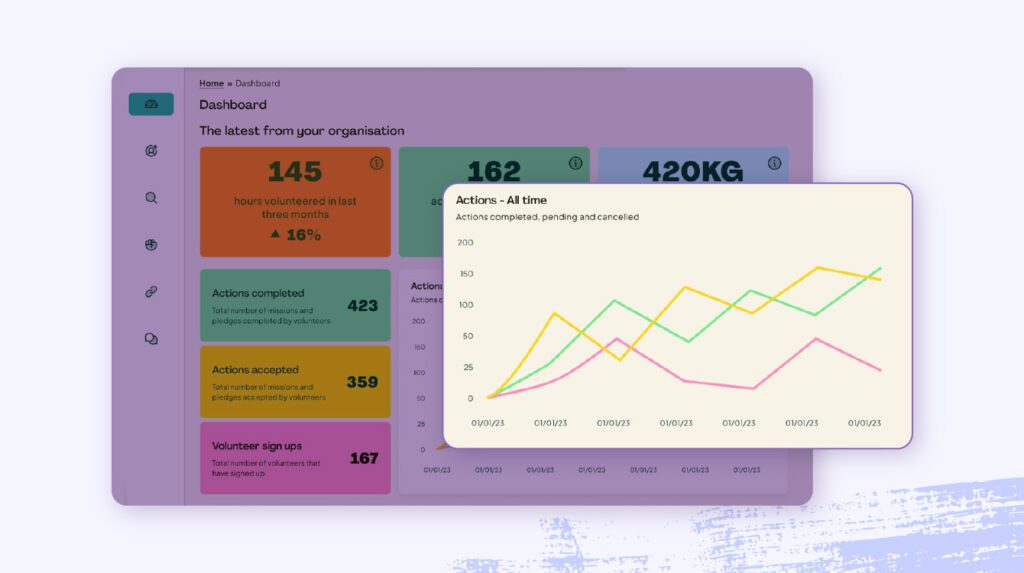
OnHand is a mobile application designed to connect employees with immediate, local volunteering needs posted by nonprofit organizations. It focuses on bite-sized, on-demand opportunities that individuals can easily fit into their schedules, such as delivering food, packing supplies, or providing virtual support.
OnHand is best for companies wanting to boost employee engagement in their local communities through accessible and flexible volunteering options. Its mobile-first approach and focus on micro-volunteering make it appealing to a wide range of employees with varying schedules and availability.
Key features
- Micro-volunteering opportunities: Connects employees with short, local, and immediate needs posted by nearby nonprofits
- Mobile-first platform: User-friendly mobile application for easy browsing, sign-up, and participation in volunteering activities
- Location-based matching: Connects employees with opportunities in their local area, fostering community engagement
Pros and cons
| Pros | Cons |
| Offers a simple and accessible way for employees to engage in local volunteering | May not cater to skills-based or long-term commitments |
| Mobile-first design enhances user convenience and accessibility | Availability of opportunities depends on the activity of local nonprofits on the platform |
| Provides automated tracking of volunteering hours and impact | May require active promotion to employees to drive adoption and participation |
Rating
- G2: 4.5
Pricing: Starting at $1,988/year
Other CSR solutions
In addition to the 13 options above, here are six more noteworthy CSR solutions to consider:
| 14. Percent Pledge Giving Platform Best for: Increasing employee participation | 15. Selflessly Best for: Simplified volunteer management | 16. Bright Funds Best for: Giving to global charities |
| 17. Submittable Best for: Prioritizing employee experience | 18. Salesforce Philanthropy Cloud Best for: Integrating with other Salesforce products | 19. CSRconnect Best for: Customizing and configuring engagement strategies |
Benefits of CSR management software
By centralizing data, streamlining processes, and providing robust reporting capabilities, CSR platforms empower companies to move beyond ad hoc efforts toward strategic types of CSR initiatives.
- Increased organizational efficiency: CSR management software streamlines various tasks associated with social and environmental programs, such as managing grants, coordinating volunteer events, tracking donations, and collecting sustainability data. This automation reduces manual effort and allows CSR teams to focus on strategic planning and impactful program implementation.
- Accurate impact reporting: A key benefit of this platform type is its ability to facilitate the collection, analysis, and reporting of impact data. It provides CSR reporting software for tracking key performance indicators (KPIs) related to environmental sustainability, community engagement, and ethical practices.
- Enhanced employee engagement: By providing a centralized platform for discovering opportunities, tracking participation, and recognizing contributions, CSR tools foster a culture of purpose and empower employees to make a positive impact.
- Increased brand reputation: Demonstrating a genuine commitment to social and environmental responsibility can significantly enhance a company’s brand reputation. The best CSR software systems help companies effectively communicate their positive impact to stakeholders, including customers, investors, and the wider community.
Key features to consider when choosing the best CSR software
Selecting the best CSR software is a critical decision that can significantly impact a company’s ability to effectively manage and measure its social and environmental initiatives. Here are the top tips to choose CSR software that’s right for your needs:
Grant and volunteer management
Robust systems should offer comprehensive tools for managing both grantmaking and volunteer programs. This includes features for application processing, review workflows, fund distribution, tracking volunteer hours, and communication with grantees and volunteers.
Impact measurement
A crucial aspect of CSR software is its ability to track and measure the social and environmental impact of initiatives. Your platform should provide tools for defining KPIs and collecting relevant data to generate reports.
Stakeholder engagement
The right CSR software should facilitate communication with various stakeholders, including employees, customers, communities, and investors. Look for features such as communication tools, portals for stakeholders, and feedback mechanisms.
Employee matching
For companies that offer matching gift programs or volunteer hour matching, your system should include features for employees to easily submit matching requests, automated verification processes, and clear reporting on employee participation.
Financial tracking
Comprehensive CSR systems should include features for tracking the financial aspects of CSR programs, such as donations, grants disbursed, and administrative costs. This allows for better budget management, financial accountability, and accurate reporting on CSR spending.
External integrations
The ability to integrate seamlessly with other business systems is a key consideration. Integration with HR platforms, accounting software, CRM systems, and other relevant tools can streamline data sharing, automate workflows, and provide a holistic view of the company’s CSR efforts within its broader operations.
Grow your impact with Bonterra CyberGrants
Choosing the best CSR software is a pivotal step in maximizing your corporation’s social and environmental impact. By utilizing a centralized CSR platform, you can eliminate the silos that hinder effective giving management, allowing you to orchestrate your initiatives with precision and purpose.
Bonterra CyberGrants offers a powerful and configurable solution to streamline your CSR initiatives, enhance stakeholder engagement, and provide accurate, insightful reporting.
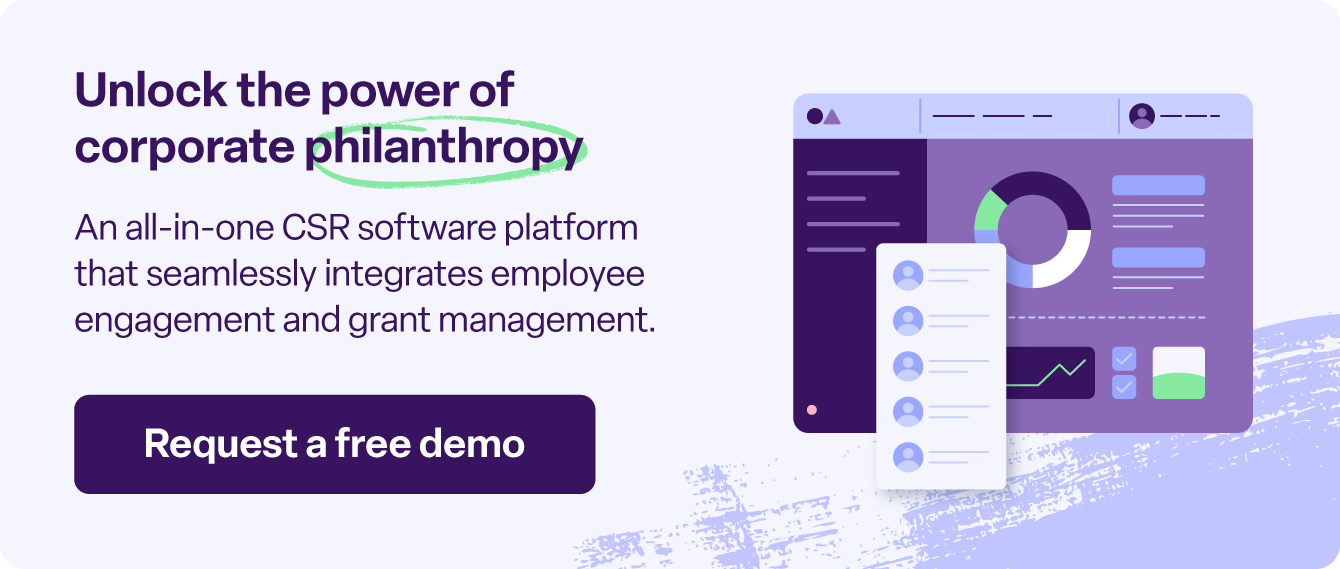
FAQ
What is CSR software?
CSR software is a technology solution that helps corporations manage, track, and report on their corporate social responsibility and sustainability initiatives.
What is the best CSR company?
The best CSR company will depend on your unique needs. That said, Bonterra CyberGrants stands out as a top provider of CSR and impact management software solutions, offering a range of tools for grantmaking, volunteer management, environmental sustainability, and overall impact measurement.
What are the 4 types of CSR?
The four main types of corporate social responsibility are:
- Environmental responsibility: Focusing on reducing negative environmental impact
- Ethical responsibility: Ensuring fair business practices and ethical behavior
- Philanthropic responsibility: Engaging in activities that benefit society
- Economic responsibility: Operating in a financially sound way while considering social and environmental impacts
Work with Bonterra



